The Making of “Fangasm: Supernatural Fangirls,” Part One – The Untold Stories
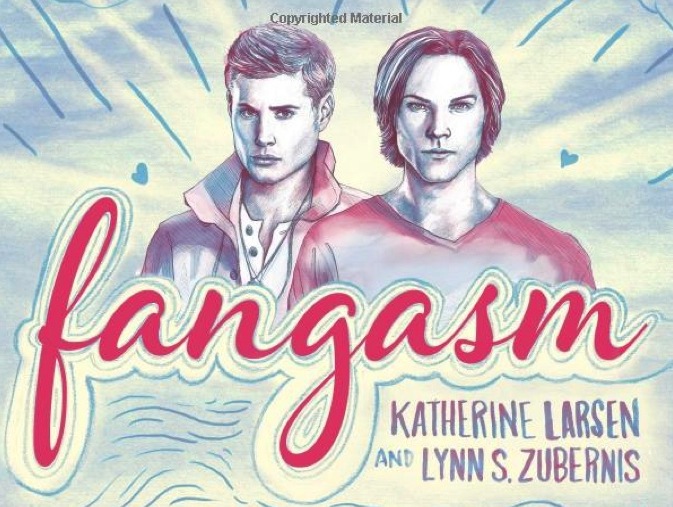
“We couldn’t find our fangirl selves in the research. …so we decided to write a book of our own on fans – one that we thought, rather naively, would set the record straight. We would figure out what being a fan was all about and we would get it right!… This is not that book. [This book] is about the excitement of being passionate enough about something to throw caution to the wind and indulge – and about the price we pay when we do.” (Prologue, Page xii)
After reading their latest book Fangasm: Supernatural Fangirls, I was lucky enough to get a full hour of Lynn’s time (rare indeed!) to ask her questions about what it means to be in the Supernatural Family, about her interactions with the cast and crew of Supernatural and about the personal cost of her success. Her stories were both enlightening and heartwarming. Here is that interview, presented in two parts, because every word evokes understanding of self and fandom.
The Book
How did you come up with the word “Fangasm”?
This is a great story actually. We were at ComicCon. It was not one of the years that was in the book. It was later, maybe 2010? We were with a friend of ours, Brenda. We had gone to the Supernatural panel and it had been awesome. We were walking along on the ComicCon floor when Brenda said, “I think I just had a fangasm!” I was like “That is the best word ever!” In that moment we stopped to talk to John Barrowman [“Captain Jack Harkness” of Dr. Who and Torchwood]. Brenda, who is a journalist, knows him so he invited us into wherever he was sitting. We were still talking about Brenda coining that word when John said “That is the best word I ever heard. Somebody should write a book and call it that!” Kathy and I looked at each other and said “That’s the name of the book!” So it was Brenda and John Barrowman!
Then when I was at WizardCon in Philadelphia last year, John Barrowman was there. I didn’t want an autograph (I don’t really do autographs), but I wanted to thank him and tell him that we had used that name. So I waited probably two hours in the autograph line. Just as I got [to the front of the line] they said, “OK, that’s it. He is not doing any more autographs for the day.” I was so distraught! I said to the woman, “I don’t even want an autograph! I just wanted to tell him something.” She said, “You just want to speak to him?” so she brought me back and I got to tell him the whole story. He was so psyched. It was a full circle moment. It was very cool.
No one ever asked how we came up with the word. You get the exclusive on that!
“What is it about being a fan that makes us, and so many others, push the boundaries of common sense to pursue the emotional rush of fandom? What was compelling enough to make us trade our briefcases and textbooks for autographs and plane tickets…And why were we all so ashamed of it?” (Page 1)
We are not sane, rational, logical people 100% and we’re also not emotional, passionate, not-entirely-rational people 100%. Really, a healthy human being is a mix of both of those. We can’t find a way to express both of those sides of ourselves, so modern life has pushed us to fall into roles that keep us confined as logical and rational. I would argue that it has maybe even pushed women to be this way more than men. If we have emotions at all, we’re allowed to have the care-taking emotions. We are allowed to love our children and our partners. We are even allowed to love our jobs a little bit, but there is no sense of emotional abandon. There is no sense of irrationality allowed, and really irrationality is not a bad thing. That’s were creativity comes from, that’s where passion comes from. We don’t get a lot of emotional satisfaction out of life if we don’t make room for that part of us. A lot of us sublimate that part of us and feel like we are not really allowed to have it. That is where the shame piece comes in.
The Shame
“We were those ashamed fans, still struggling toward some kind of legitimacy so that we could stop being ashamed.” – ChicagoCon, 2008 (Page 189)
Yes. Personally, I feel like I have made a ton of progress because I was extremely ashamed in the beginning. Kathy was too. I think we expressed that shame in different ways, but we definitely both felt it. We both felt like we were doing something we weren’t supposed to be doing, we weren’t allowed to be doing. We hid it for a long time from our families and from our colleagues. We had no intention of “outing” ourselves in a book. That was the furthest thing from our minds. We just wanted to write an academic book, be anonymous academic authors, have a bunch of academics read it and that would be it. But by outing ourselves and being more open about it, well, once you come out of some sort of closet, you get feedback [which] is almost never as horrendous as you fear it is going to be. Not that you won’t get negative feedback, and we did. Almost anything you out yourself about will get negative feedback because there are going to be some people who will be like, “Oh, I don’t like you being like this. I want you to be logical and rational and only care about taking care of your partner and your children. That’s how I want you.” But there will be the other people who will say, “Wow, I read your journey. Now I can do it too.” It has been one of the most fulfilling things I have ever done. Hundreds of people e-mailed us and came up to us in conventions and tweeted us to say, “This book changed my life. It made me feel OK about being a fan. It validated what I feel. It took away the shame for me.” That is exactly why we wrote it. It has been an incredible, incredible honor to have that happen. Just absolutely a privilege.
Was there a moment when you felt the turnaround in you personally, going from shame to “I’m not worried about this anymore?”
I can remember (and this is in the book) when we were just getting to know Betsy Morris, who was the screenwriter for the film 10 Inch Hero. She didn’t really know our fangirl selves. She just knew us as researchers, but she stumbled upon our fangirl selves online and just very casually was like “I love your fan fiction.” I remember literally running away from the computer, sitting down in a chair with my head in my hands and going, “Oh My God, Oh My God, Oh My God”. She had not said anything except positive, flattering things. To her it was just an offhanded statement but that shame was just so… I did not want her to know my fangirl self. I only wanted her to respect me as a researcher. So I can contrast that with people who I’ve met [since] we outed ourselves in the book as fan fiction writers. Now people come up to me and say “That made such a difference. That is awesome. You are a real fangirl.” People know everything that I’ve done – all kinds of embarrassing fangirl moments that I’ve had, like sobbing after meeting Jensen for the first time. I don’t feel any shame at all anymore. I just feel like that is what I wanted to do. I put it out there the way it really was so that people could be validated. That was the only way to do it. So that is a huge difference for me.
“As much as we kept talking about how fans shouldn’t be ashamed of becoming fans, that’s exactly what we were suddenly feeling.” (Page 198)
Oh, I remember that moment! We were sitting there camping out with all the other fangirls all night long and Chad came walking through. Again, he only knew us as academics researching fandom. He did not even realize that we were fans too, so he literally stopped and said “What are you doing here? Why are you sitting on the floor?” Instead of saying “We’re sitting on the floor because we are fangirls camping out to get close to Jared and Jensen”, we said “Oh this is our job. We are researching the book. Don’t film us.” He said “Oh, right. OK.” It was a great metaphorical moment because he chopped us out of the film he was making. We were not fangirls, so we would not be in his film, and yet we absolutely were.
Why Join a Fandom?
I wanted to get into some of the messages in the book. The first was that being a fan of a show is different from being in a fandom. What constitutes being in the Supernatural Family? What puts a person in the fandom as opposed to just being a fan?
In fan studies research, there are different theories of fandom. In each of them there are hierarchies – viewers, audience members, participatory fans, observational fans. [The theories] all kind of say the same thing. You can be a casual fan of this show, meaning you watch it every week. You have absolutely no desire to do anything else but watch the show. Whereas being in a fandom means that in some way you participate in the community of other fans. Maybe you do it by going on a message board and having discussions. Maybe you do it by going on Twitter and following a hashtag, or tweeting back and forth to the writers or the actors. Maybe you just go to conventions, so once or twice a year you come together with other fans and with actors and you celebrate your fannishness that way. Maybe you are a fan who writes fan fiction or makes fan art so you are on deviantArt and have a community on there. Maybe you make videos and have a community of fandom on YouTube. There’s lots of ways to do it but being in a fandom means somehow you are plugged into a community of other fans.
“What we actually got was something we didn’t even know we were looking for. In fandom, we found a community of others – a group of people who, like us, had always felt different…Fandom turned out to be about validation and acceptance. Fandom is all about belonging.” (Pages 19, 20)
I’m still not entirely sure. I’m very aware that every time you start to talk about fandom filling a need, it seems to imply that because there is a need, there is some kind of pathology. That if it is filling a need that there’s something that was missing. I want to be careful not to imply that, or at least not to imply pathology, but I do think that for a lot of people there is something missing. I don’t think that is a pathological thing. I think it is part of the way our culture is, part of modern society. We don’t have a lot of community. We don’t have the kind of community that we used to. We don’t go outside and hang our laundry on the line and talk with everyone in the neighborhood over drying clothes every day. We don’t have a lot of the ways that we connected with other people. I think there is a need to connect with other people, and fandom can be one of the ways to do that.
“It’s never a conscious decision: we don’t get to choose a fandom. It chooses us.” (Page 5)
“Now, as mid-life loomed, we were both in need of…a place to figure ourselves out for the second time. Who were we now, after defining ourselves as partners and mothers for decades?” (Page 7)
There is a difference between looking and going after… between appreciating someone, looking, desiring, fantasizing and “Hey, I would like to have this 30-something dude.” Fantasy serves a completely different function for humans than sex. Fantasizing is not wanting to have sex with someone. It’s different.
“Fandom was giving Kathy a measure of self-confidence that she rarely felt in her real life. In fact, fandom was giving that to both of us… Being our real selves-and figuring out for the first time what we really wanted gave us the validation that we needed to start feeling good about ourselves.” (Page 63)
Yes, and I think it’s not just that. Part of it was classic use of fantasies for escape, and that is a healthy use of fantasies – I mean that in the healthiest way possible. We all need escape, and fantasy is good for that, but I think it was also about identity. A lot of people fall into fandom (and I’ll just talk about Supernatural because that is the only fandom I have really studied) because they came to a point in their life where all the ways by which they had defined themselves were pulled out from under them. So when you’re raising children and getting a career off the ground or making a marriage work – that takes up all of your concentration. That is what you’re doing. If you are lucky, those things go kind of well and you arrive at where you are and you are like, “Wait. I haven’t really been thinking about me. I haven’t been figuring out who I am. Who am I now that I have done all those things?” In a strange way, people use fantasy through fandom to work on that second identity crisis. That is what a lot of women in that age group talked about. Women who are in their teens and twenties are usually in the same way, except they are figuring themselves out for the first time.
It is coming full circle.
Yes. I think that is what happens. Humans have sort of cyclical lives. One psychological theory talks about the different roles people take on at different times in their lives. [We] literally have to figure ourselves out multiple times because circumstances change so much as we go through the decades. So figuring out who you are in your teens and your twenties is not the same person you have to figure out again in your forties and fifties.
…because your experiences have changed who you are even as much as your circumstances.
Exactly. And you don’t have time, if you do the partner, kid, or career route. There are a couple of decades in there where you are too busy to figure anything out or even to think about yourself. At least that was my experience. It was like 20 years, then I came out on the other side and was like “OK, that went pretty well, but where am I? Who am I?”
I wouldn’t have said when I started watching Supernatural that I was looking for anything. Are fans aware that they are looking for that redefinition or is it subconscious?
No, I think it is completely unconscious, not even subconscious. I had no idea either. It took literally years of thinking about it and researching it and reading other people’s theories. There was already a fair amount of work on fandom and identity. It wasn’t the same kind of work that we ended up doing, but it set us on the roads to figure it out. Talking to other fans and experiencing it ourselves took us the rest of the way to developing a coherent theory.
“Fandom, for both of us, had been a refuge in the past in times of crisis – from the…constant doubts of adolescence to the terrors of grad school…” (Page 6)
Yes. I sometimes hesitate to say it is filling a need because that immediately makes people say, “Oh, pathology. These are needy people.” I don’t think fans are any more needy than anyone else. I think we all have these needs and everybody has to find a way to figure them out. Some people who don’t find a way to figure them out are the ones who have midlife crises.
Actually, maybe it’s an extremely healthy group of people who are finding a way to answer their own questions or explore their own creativity.
That’s what I think. I am not saying it is the only way to do that. There are people who find other ways to do the same thing but in order to progress and stay healthy, you have to find some way to do this work.
It’s all about Sex! (or is it?)
“A 2011 research study found that the majority of female fans believed that being in online fandom had changed their attitudes about their own…sexuality…They felt relieved of shame and embarrassment and freed from social proscriptions that limit women’s expression of sexuality.” (Page 44)
That woman across from us in Starbucks just turned around and glared at me like I had said the most horrible thing and I was like, “She is making my point for me! This is so funny!”
Is it really all about women finding their expression of sexuality? What about the other things you talk about, e.g. that we are more comfortable being rational beings, or that we are slotted into roles that people are comfortable with? Does it still all come back to sexual identity?
No, no. I think it is both. I do not think you can narrow it down. My exclamation was amusing but I don’t think it is all about sex. Certainly there are many, many fans that that is not what they need to explore – that is not what they need to find validation around. There are plenty of fans who are not interested in lusting after Jared, Jensen or Misha. So I don’t think everyone is using fandom to explore sexuality. A lot of women are [though]. There’s plenty of research out there that talks about how women are never encouraged to explore their own sexuality, certainly not their own desire. We’re socialized to be objects of desire. We get really good at that. We know what make-up to wear, how to keep ourselves skinny and how to wear clothes that make us look good. We are all about being looked at, but we get no experience whatsoever in really figuring out “What do I actually desire? What do I want to look at? What turns me on?” Women are never encouraged to think that way. It is a big leap outside of a socially prescribed comfort zone to jump into fandom and suddenly be objectifying and exploring things in fan fiction and fan art that are purely fantasy. Maybe you wouldn’t want to have anything to do with [these things] in real life, but you’ve never been allowed to think about [them]. Whereas men are much more encouraged [to fantasize]. There is a double standard. There is a lot of research that shows this really damages women because women are very disconnected from their own desires.…but I don’t really think it is all about sex. For some people it is much more about exploring other facets of identity. Sex is not the only facet of our identities certainly.
“Women seem to be vulnerable to feeling ashamed of whatever it is that they use their leisure time for.” (Page 31)
That is what so many of us do. That’s the stereotypical way that women read Supernatural novels, fan fiction, look at pictures of Jared and Jensen or whatever it is. We sneak away as though what we’re doing is something totally pathological. I mean look at the sneaky factor there. It shows how much shame is attached to it. Just imagine a guy sneaking around watching a basketball game on his tiny little phone and hiding it under his pillow because he doesn’t want anyone to know he is watching basketball. That’s how ridiculous it is.
So we are part of a revolution to get people to accept that we also need our own time, and we shouldn’t be judged by how we want to fill it.
Exactly, and I think that you’re picking up on the dual challenge: Trying to get other people to accept that, but also trying to get ourselves to accept it.
How generational is that? Do the college aged students feel freer to use their time as they wish?
I often ask my students about this because I like to keep the research going. I also talk to plenty of young fans in their late teens and early twenties. I think it is a tiny bit better but I don’t think it’s much better. One of the concerns we had in writing Fangasm was would it be too skewed toward women in their forties which is where we were when we were writing it. Would people in their teens and twenties be able to relate to it or have things changed? Well, from the hundreds of emails, reviews, tweets and people coming up to us at conventions, [we have learned that] nope, they can relate to it just as much.
“Once you’re hooked, you want more… Being a fan of anything entails a great deal of emotional investment. Some recent research on music fans found that the intensity of emotion…lit up the brain’s pleasure center.” (Pages 10, 12)
You talked about how the absorption and addiction model [applies to fandoms]. That is so absolutely true! The more you get, the more you want! Addiction is usually looked at as a bad thing. Is being in a fandom an exception to that, or is it really an addiction in all senses of the word?
We think of addiction as a bad thing but in this sense, it is a normal human reaction. We are addicted to chocolate. We are addicted to feeling good by going down a roller coaster. There are a lot of things that follow the addiction model that are not being addicted to crack. It is a continuum, but does it carry the potential to be harmful? Yes. Anything that has that kind of reinforcement contingency setup that makes you want more of something that makes you feel good can be pathological, but the vast majority of fans don’t slide over into the, “I am going to sell all my possessions on a street corner in order to go to a convention.” Still, the model is applicable. Almost anyone who has fallen into a fandom can relate to that. It‘s human. If something feels really good and makes you happy, of course you want more of it. Why wouldn’t you? Look at the euphoria when you are at a convention or a concert or whatever. That is euphoria. It is a wonderful thing. Of course we want more of it but our decision-making and logical functions that are alongside our less logical functions kick in and we make hopefully [good] decisions.
*****
In Part 2 of the interview, Lynn tells us about her dinner conversations with Jared and Jensen, what Eric Kripke thinks of fans and the special phenomenon that is the Supernatural Family. She also talks about the personal cost of writing her book. Don’t miss it!
If you haven’t yet read Fangasm: Supernatural Fangirls, I highly recommend it! While following the stars of Supernatural across country, Lynn and Kathy share their research and insights on the psychology and inner workings of fandoms. During their journey, they grow personally and professionally, but their triumphs are tempered with the personal cost of their pursuits. By the end of the book, you are cheering for them as they achieve their goal of gaining insider access to Jared Padalecki, Jensen Ackles, Misha Collins, Jim Beaver and so many other members of the Supernatural cast and crew. Check out the book on Amazon by clicking the “Fangasm” button at the bottom of the “Articles” page on our website!
-Nightsky
@Lsangel2
Copyright 2014
(Part two of the interview can be found here.)



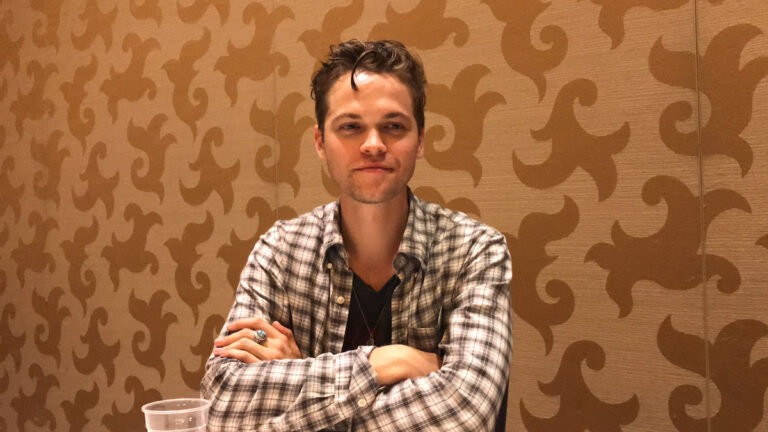

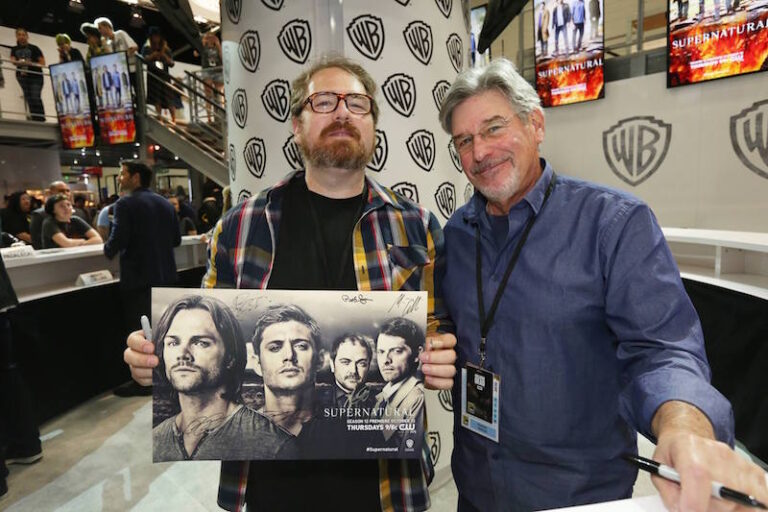
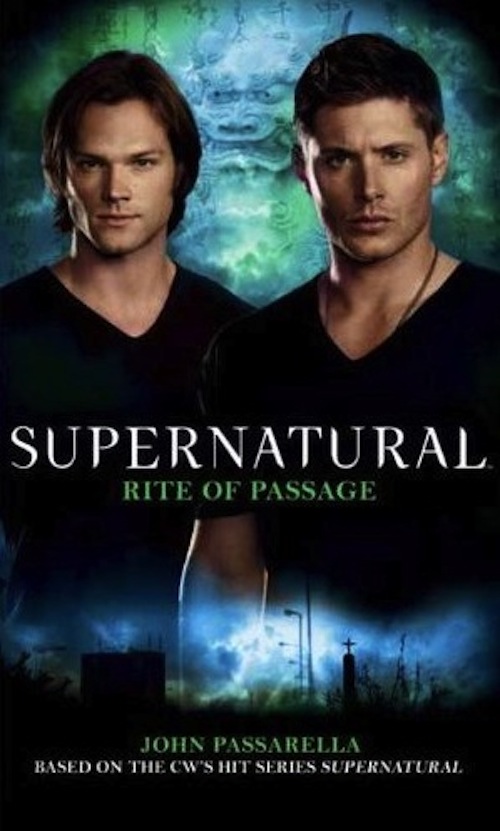
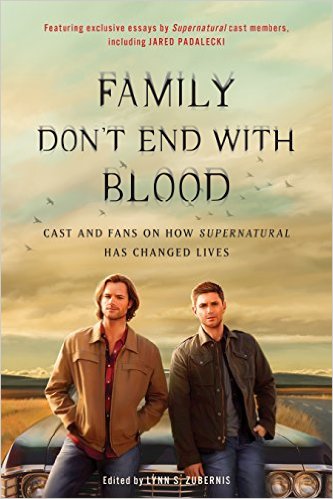
I love this interview! It has all things in it I want to relay to my husband about what it means to be in the fandom. I envy that Lynn has let go of the (unnecessary) shame, I strive to do the same.
Jessie, Thanks for the feedback. You were the one, lone lucky person that got through the commenting system’s problems when this was published! I even tried to reply to you several times but was thwarted every time. Did you happen to buy a lottery ticket the day you left the comment? 😉
BTW, my husband ended up reading [i]Fangasm[/i] (partially because I was talking about it so much while writing these articles). THAT led to some interesting conversations!